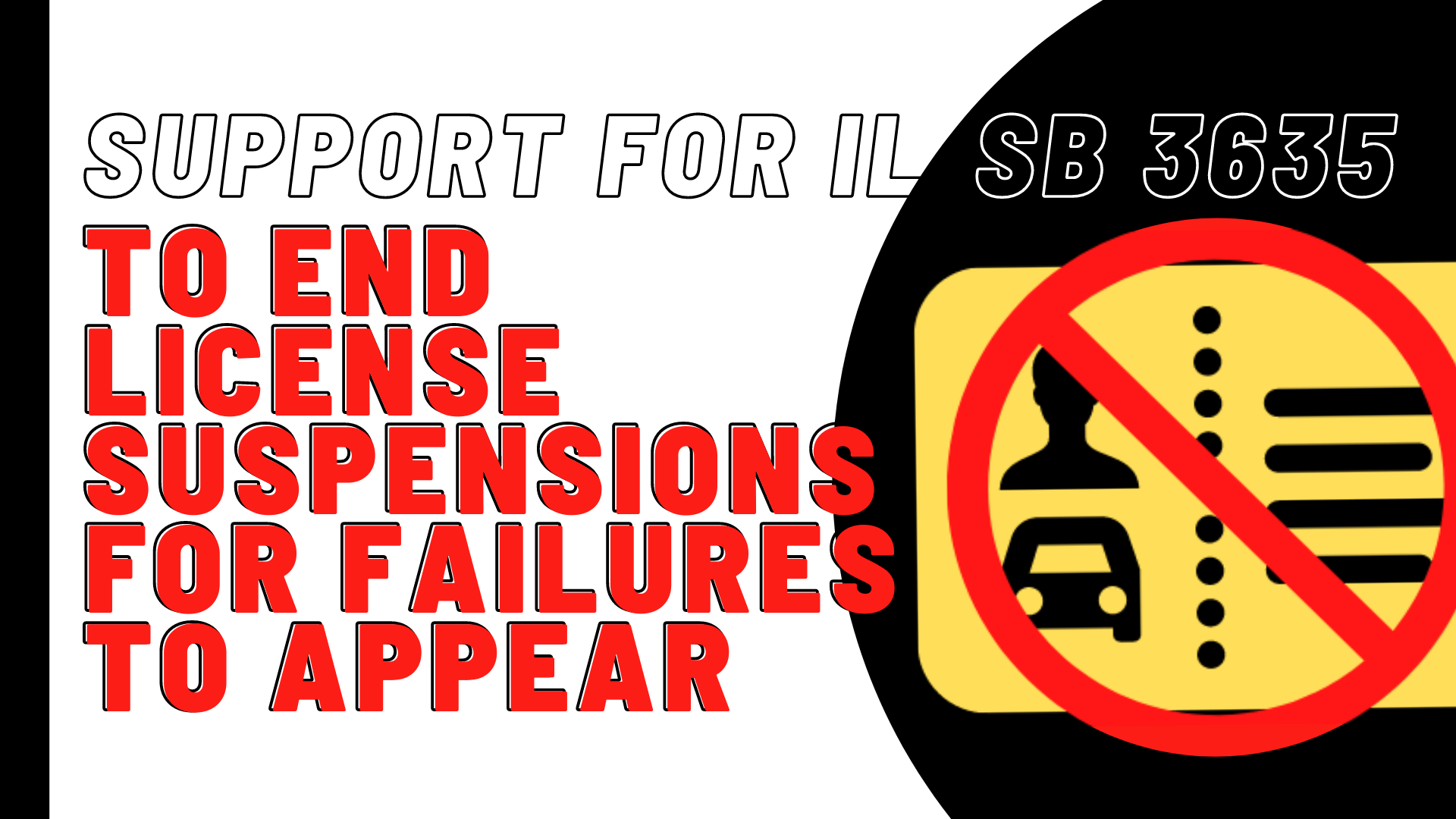Support for SB 3635 to End Driver’s License Suspensions for Failures to Appear
UPDATE: HB 5588 has been assigned to committee for hearing on Wednesday, February 16. Please submit a witness slip in favor of the bill, as a “proponent,” using this link before the hearing at 10:00 AM on Wednesday.
On January 19, 2022, Illinois Senate Bill 3635 was filed by Sen. Celina Villanueva. Rep. Nick Smith is the sponsor of the corresponding House Bill 5588. The bill eliminates drivers license suspensions as a sanction for failing to appear in response to a court summons, in addition to amending provisions for notice of a continued hearing when a person has failed to appear.
As members of the Transit Table Coalition, Chicago Appleseed Center for Fair Courts and the Chicago Council of Lawyers support this move to remove remaining driver’s license suspension for non-safety reasons from Illinois law.
Under the License to Work Act, passed in Illinois 2020, and the SAFE-T Act, passed in 2021, Illinois stopped suspending drivers’ licenses as a means of traffic-debt enforcement or collection and automatically reinstated thousands of people’s suspended licenses. These two laws made it so Illinois no longer suspends drivers’ licenses for the failure to pay tickets, fines and fees related to tickets, nor for truancy. SB 3635 continues this work to remove coercive, ineffective enforcement mechanisms from the courts.
Suspending a license for the failure to appear in court does not enhance public safety.
Today, there are over 100,000 people suspended from driving in Illinois for “failures to appear” in traffic court. The top ten zip codes with the most failure-to-appear suspensions are ALL predominately Black and/or Latine, and have above-average rates of poverty. Driver’s license suspension in Illinois is a clear example of a racist system: not only is the sanction most often applied in Black communities, the impact of the sanction is significantly greater in already under-resourced neighborhoods.
Furthermore, these suspensions are often just an extension of the debt collection process for traffic tickets. Like the other debt-driven suspensions, their real-world impact is devastating to communities of color by creating cycles of debt, as well as compounding barriers to compliance and self-sufficiency by preventing people from legally driving to work or to court. In Illinois, 80% of people drive to work — and a valid driver’s license is often a condition of employment. Data shows that up to 42% of individuals lose their jobs following the suspension of their license. Obviously, having a suspended driver’s license creates a significant barrier to getting to work or keeping employment. This practice not only harms families and communities, but also harms employers, who lose access to a portion of the workforce when their employees cannot get to work.
Two of our neighboring states, Kentucky and Missouri, suspend licenses for failures to appear; Indiana, Iowa, Wisconsin, and Michigan have all eliminated the practice. In states that have removed the threat of license revocation, there’s little-to-no evidence that people are less willing to pay fees or attend court. In Idaho, for example, there’s no clear evidence that the change has affected collection rates on infraction cases, according to a state report, and in California, the payment of non-delinquent debt actually increased after the change.
We support this legislation with one caveat: we must be wary of courts replacing drivers license suspension with other punishments, such as warrants or charges of contempt of court for unpaid fines and fees. We must ensure that no more Illinoisans end up in jail for a missed court date or unpaid traffic tickets, so that we do not replace one systemic problem with another. As the bills stand now, they do not support the use of warrants to compel on a failure to appear. It is necessary this remain part of the reform.
We will continue to publish updates on SB 3635 as it moves through the state legislature. In the meantime, please contact your State Senator in support of this bill, which continues the work of ending drivers’ license suspensions for non-safety violations. More information can be found on the Transit Table’s website.

